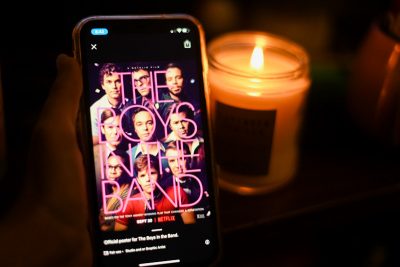A group of gay men in 1960s New York City has gathered to celebrate a friend’s birthday. But an unexpected guest and a wicked party game bring out unwelcome and unexpected realizations — some of which the men are not prepared for.

Mart Crowley’s 1968 off-Broadway production “The Boys In The Band” was revived on Broadway in 2018. The revival, helmed by director Joe Mantello and produced by Ryan Murphy, was adapted into a movie that came out on Netflix on Wednesday.
The movie has the same cast of openly gay actors as its 2018 production on Broadway — Jim Parsons, Zachary Quinto and Andrew Rannells, to name a few — and the plot explores the fears, frustrations and friendships of gay men as they battle themselves and a society against them to live fuller, more meaningful lives.
Crowley, who wrote the original play inspired by his personal experiences, adds layers of depth that unfold one by one as the characters reveal more about themselves. With a powerful performance by the entire cast, what really sees the movie through is the dialogue. Whether it’s playful jokes, veiled insults or problematic comments, they have a raw, gripping power that holds the audience’s attention.
The original production came out in 1968, a year before the Stonewall riots, and was a milestone off-Broadway production. The 1970 movie adaptation, directed by William Friedkin, was one of the first movies to center around gay characters. The Broadway production, which won the Tony Award for the Best Revival of a Play in 2019, premiered on the 50th anniversary of the original production in April 2018.
Inside a quaint Manhattan apartment, the drama begins to unfold as six friends gather with palpable tension at the party. As the evening progresses, the drama intensifies when Alan, Michael’s college roommate, who identifies as a straight man, turns up unexpectedly and stirs things up with his almost offensive resistance in accepting the dynamic personalities around him.
The night lays bare the brimming conflicts between the characters, but more importantly, the ones within them — their guilt, insecurities and dilemmas that make it difficult to embrace their identities.
Michael, played by Parsons, is based largely on Crowley himself. Michael’s nemesis Harold, played by Quinto, is a character inspired by Crowley’s friend and famous Hollywood choreographer Howard Jeffrey. Their love-hate relationship sets the biting tone of the movie.
he two characters share many traits but also have in common an equal measure of charm and self-hatred. While Michael oscillates between mocking his friends and sometimes himself, Harold believes in pampering himself any way he sees fit.
In between their self-deprecatory and spiteful exchanges, Parsons and Quinto manage to fill the silences with unexpected looks — often of vanity and unapologetic hostility but sometimes of numbing emptiness — lending a great deal of ingenuity to their characters.
Emory, played by Robin de Jesus, is vibrant, fun-loving and caring. De Jesus’ effortless portrayal makes his colorful quips and even problematic insults slide easily to make the audience fall in love with his character almost immediately. So does Michael Benjamin Washington as mild-mannered Bernard — the only African American man in the group who endures racist insults from his friends to let them feel better about themselves.
As the nine men come to terms with their realities during the course of the night, they realize they have a shared feeling of self-hatred and guilt. Though the movie does not offer a concrete resolution to all the characters and conflicts, it does give them tender moments of acceptance and love which add another layer of quiet humanity.
Some characters come across as homosexual typecasts or regressive, but the film manages to avert that disaster with its raw portrayal of the men, making them inherently flawed but also redeemable and, more importantly, relatable.
The movie ends in a somber mood completely in contrast with its beginning, but the audience is just as hopeful about the men’s lives and friendship. Michael breaks down with the guilt of having known what he’s done, turns to Donald and says the message that encapsulates the entire movie: “If we could just learn not to hate ourselves quite so very much.”

















































































































